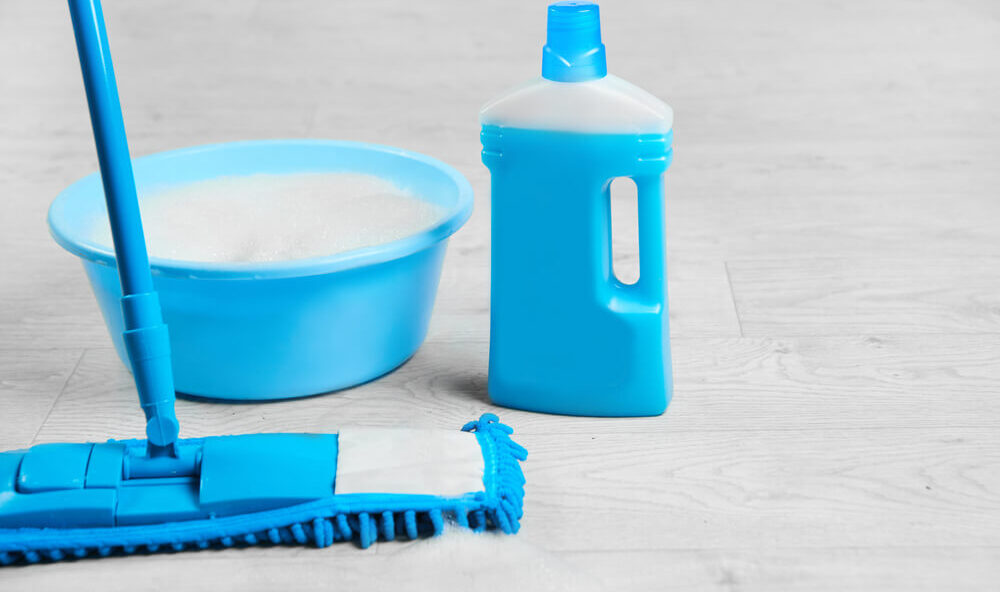
Being flooring experts, We have observed many homeowners getting confused about cleaning their floors. Most of them usually ask, “Should I mop floors with bleach?”. Helping hundreds of people, We can now guide you with all the nitty-gritty details of cleaning floors with bleach.
Floors can be mopped with bleach when diluted with water once a week. Make sure you are using bleach on hard and non-porous surface floors like ceramic, tile, vinyl, and linoleum. Never use bleach on marble or carpets.
Mopping your floors with a required amount of bleach can help your floors avoid severe damage down the road. Let’s have a look at the right way of cleaning floors with bleach.
Can You Use Bleach To Clean Floors
Yes, you can clean floors with bleach but not daily. Bleach is a potent microbe-resistant disinfectant that removes all stubborn stains, and dirt buildup, sanitizes floors and gives a very polished appearance to the floors, which a simple sweeping or brooming cannot. Cleaning with bleach is the easiest and most handy way of disinfecting your floors.

Remember, bleach is not a common household cleaner. It has strong chemical properties due to which it reacts with certain substances. Similarly, mopping with bleach is not perfect for every floor type.
Let’s have a look at which flooring can be bleached and which cannot;
1. Floors That Can Be Bleached
Bleach can be used on hard and non-porous surface floors. Bleach reacts with their top dirty layer of floors and cleans it. These floors include;
- Ceramic
- Vinyl flooring
- Tile
- Concrete flooring
- Laminate flooring
- Granite flooring
- No-wax flooring
- Unsealed Grout flooring
- Mastic Asphalt
- Linoleum flooring
2. Floors That Cannot Be Bleached
Some floors have soft and porous surfaces. When you apply bleach on them, due to the strong chemical nature of bleach, it penetrates deep into the layers of floors and erodes their top layer. This is why they are not allowed to sanitize with bleach. These floors include;
- Marble flooring
- Wood flooring
- Carpet
- Stone flooring
- Waxed finishes flooring
- Carpet Odors flooring
- Timber flooring
- Bamboo flooring
- Cork flooring
- Rubber flooring
How To Mop Floors With Bleach
After analyzing the type of your floors, you must adopt the right way to clean your floors with bleach. Let’s have a look at the necessary things you will need while cleaning and the right step-by-step guide of mopping with bleach.
1. Things You Will Need While Cleaning Floors
Gather all the following necessary cleaning tools and materials before starting the process;
- Dry Microfiber cloth or mop
- Bleach
- Bucket
- 1 gallon of water
- Broom
- A pair of gloves
2. Stepwise Guide To Mop Your Floors With Bleach
Once you are ready to start the process, follow the step-by-step guide for better, quick, and easy cleaning;
- Analyze your floor type and choose the bleach accordingly. Strong bleach should be used for hard surfaces, whereas mild ones go perfectly for soft porous surface floors.
- Wear your gloves before starting the cleaning process. Open all the windows and doors for the best ventilation.
- Sweep clean or broom the area before mopping with bleach. This will remove all the scratchy material and prepare your floor for disinfection.
- Mix one cup of bleach with one gallon of water to dilute it properly.
- Take a microfiber cloth or mop and damp it with this diluted bleach water. Ensure that your mop is moist and not dripping bleach water. Wring it thoroughly so that it does not contain extra water. You can also use a spray bottle to spray this bleach water on the mop for less bleach.
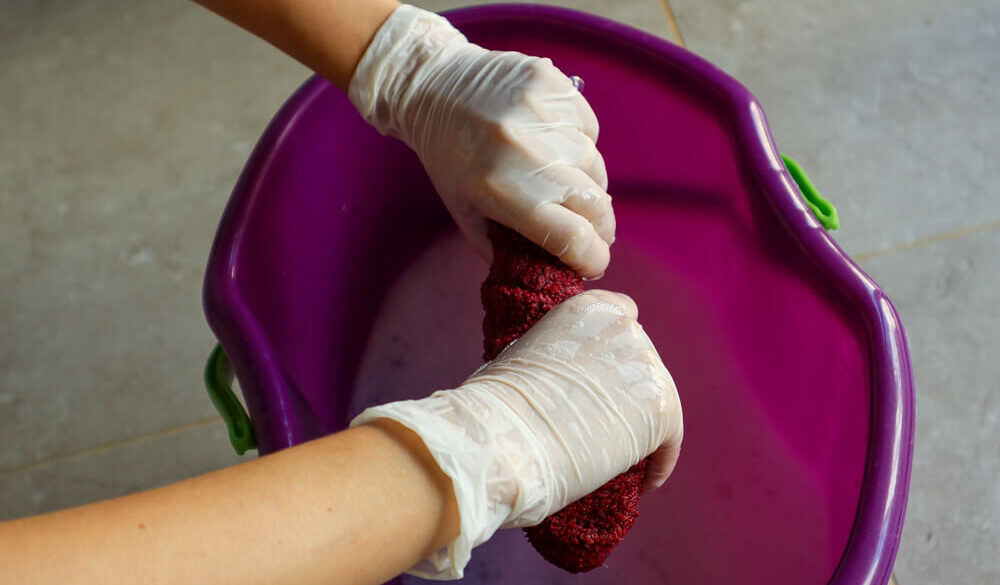
- Wipe your floors thoroughly with this bleach-damped mop until no stain is left on the floor.
- Let your floors air dry in a well-ventilated room. If proper ventilation is not possible, rinse the floors with lukewarm water.
Following these steps carefully will help you get benefits from floors without causing any harm.
Helpful Tips For Cleaning Floors With Bleach
Following some helpful cleaning tips make your process easier and more effective. Here are some of them;
- Never forget to wear gloves while using bleach.
- Use the correct concentration of bleach water. It should not be over-diluted or super-concentrated.
- Never mix bleach with other household cleaners.
- Do not use a sopping wet mop. It should be slightly damped with bleach solution.
- Consult the manufacturer for the floor properties and its recommended cleaning process.
- Store bleach in cool and dark places away from sunlight and children’s access.
- Keep the room properly ventilated for better air drying.
How Much Bleach Can I Use To Mop Floor
Remember, bleach is a harsh disinfectant. You cannot use it in its original condition. It may fade away the luster of your floors. To use it safely, We recommend you dilute the bleach by mixing it with water.
A proper ratio of water and bleach should be maintained. Too much water makes the bleach ineffective in cleaning the floor properly, whereas excess bleach can damage your floors.
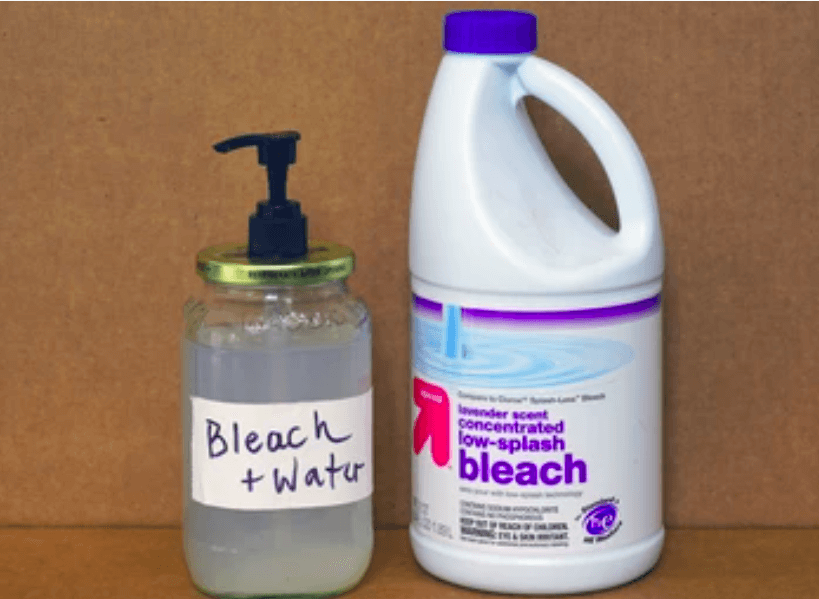
Always mix 1 part of bleach with 51 parts of water to make a perfect concentration of bleach water. It is usually 5 tablespoons or a small cup of bleach in one gallon of water.
How Often Should I Use Bleach Water On My Floors?
Daily use of bleach on floors is strictly prohibited. It weakens the floors and decreases their life span. We recommend you mop the floors with bleach once a week. Do not overuse it.
It is preferred if you use it once a month or often when you find a need to restore the polish of your floors. Leave the bleach on floors for 5-10 minutes only and then wash it off.
Some Pros And Cons Of Using Bleach On Your Floors

Due to the chemical nature of bleach, there are some advantages and disadvantages associated with its regular use.
1. Pros Of Using Bleach On Floors
Let’s have a look at the benefits;
- It has an antimicrobial effect due to its sodium hypochlorite components. It is used to disinfect floors, prevent all kinds of microbial contamination, and prevent waterborne diseases in swimming pools.
- Bleach prevents mold growth on floors. It is used to double-clean the area to eradicate molds and allergens. It also removes mildew that can cause serious health issues.
- It’s a very cheap method of refinishing your floors.
- Bleach removes the smell from the room.
- It kills all types of bacteria.
2. Cons Of Mopping With Bleach
Given below are some of the possible drawbacks of using bleach;
- Bleach changes the chemistry of the room. Its constant use may cause health issues like skin problems, irritation in the eyes, burning, inflammation, lung irritation, and vomiting.
- It reacts with the metal and erodes them.
- It has a slightly pungent smell.
- It does not work on porous surfaces.
FAQs
Let’s have a look at some of the commonly asked questions;
1. Can Bleach Damage Hardwood Floors?
Bleach can damage hardwood floors if used in high concentration and left for a longer time. Its great contact with floors may damage the upper layer of floors by altering its color. Use a balanced bleach water solution in the right way for the right time to benefit from its cleaning effects.
2. Do You Need To Rinse The Floor After Mopping With Bleach?
It is preferred to rinse the floors after mopping with bleach and letting them air dry. It will remove all the residues left behind. This prevents the floors from harm caused by the continuous use of bleach.
3. Can You Use Bleach With Hot Water?
Bleach can be used with both hot and cold water. In cases of warm water, bleach reacts, and more chlorine gas is produced, which makes it more reactive to other cleaners. With hot water, you should not mix it with detergents.
4. Can I Mop Floors With Bleach If I Have A Dog?
Be careful while mopping with bleach if you have a dog at home. The fumes of bleach may cause serious health complications to them. Keep your pet away from the bleached area until it is completely washed and dried.
5. Should I Mop With Bleach Or Vinegar?
Vinegar is as effective as bleach. Vinegar is used for mild cleaning and sanitizing the area to some extent, whereas bleach is a powerful disinfecting agent to cleans the area completely. Therefore, it is preferred to mop with bleach. Be careful! Never mix both of them because the resulting fumes are toxic and can be deadly.
Conclusion
Bleach can be used to mop floors with certain limitations. It has both positive and negative effects. To avoid them, you should clean the floors with properly diluted bleach once a week. It is perfect for hard floors and cannot be used on soft and porous surfaces. Avoid its continuous use to protect your floors from damage.
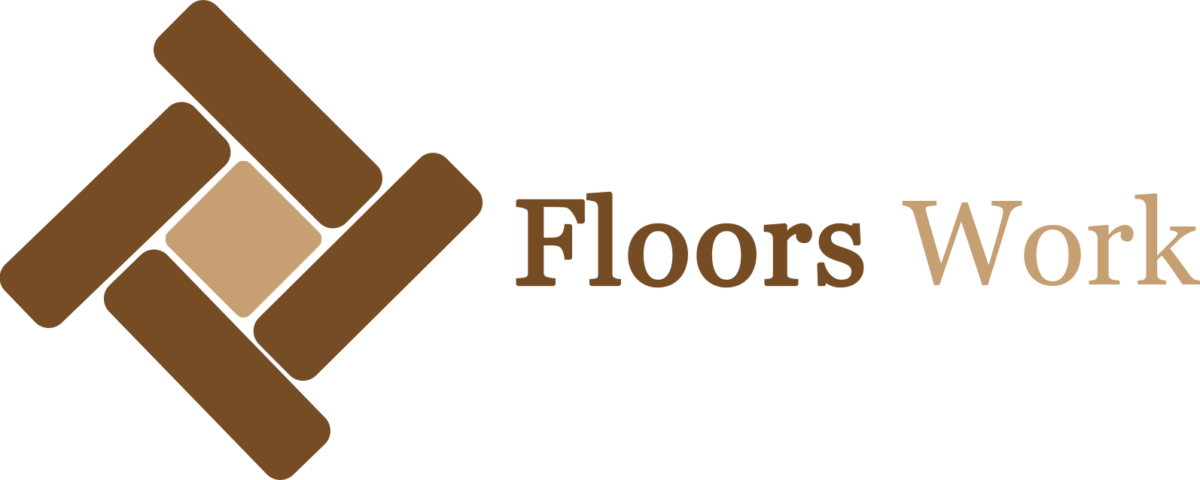
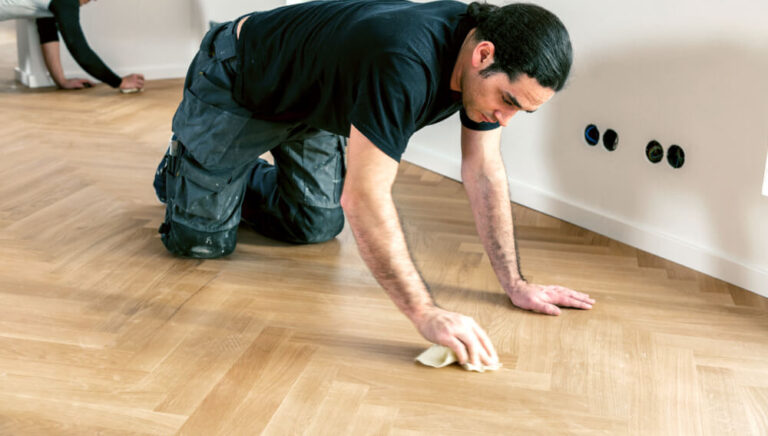
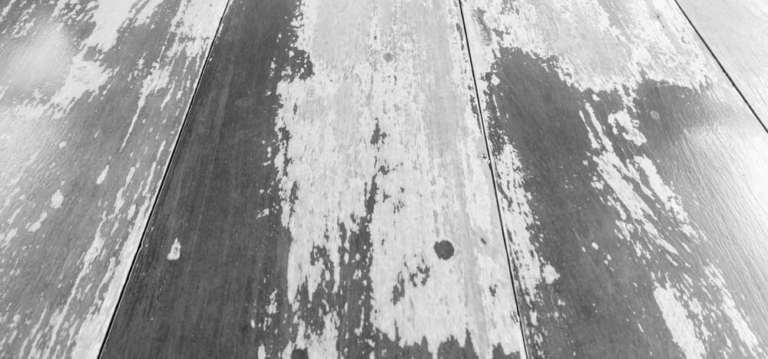
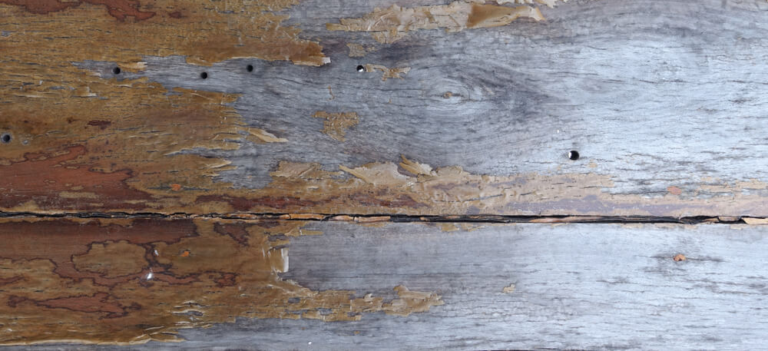
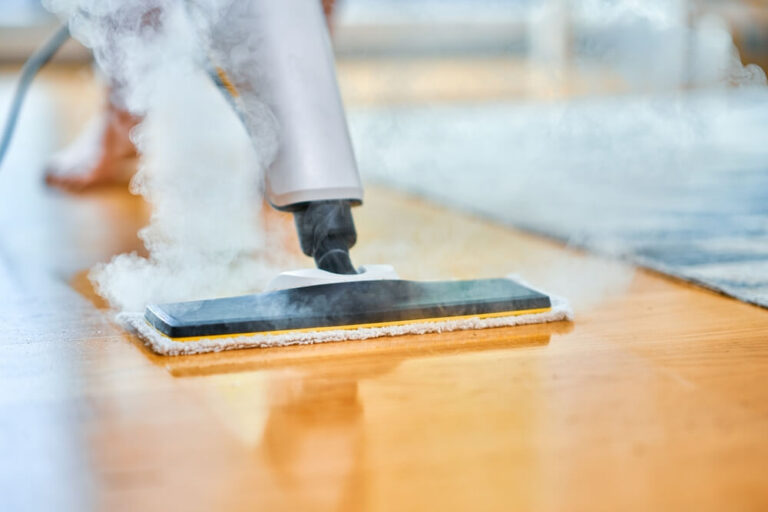
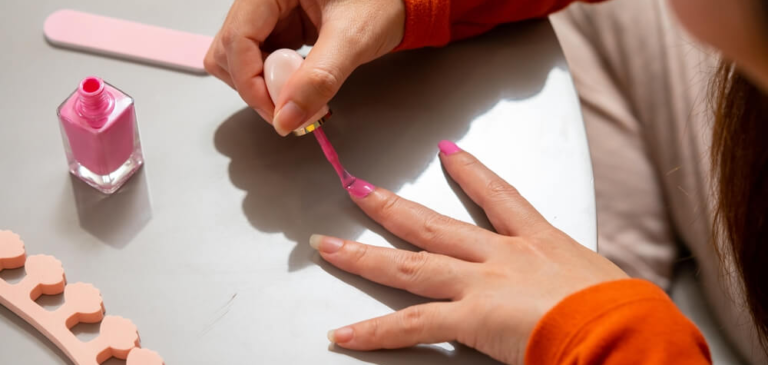
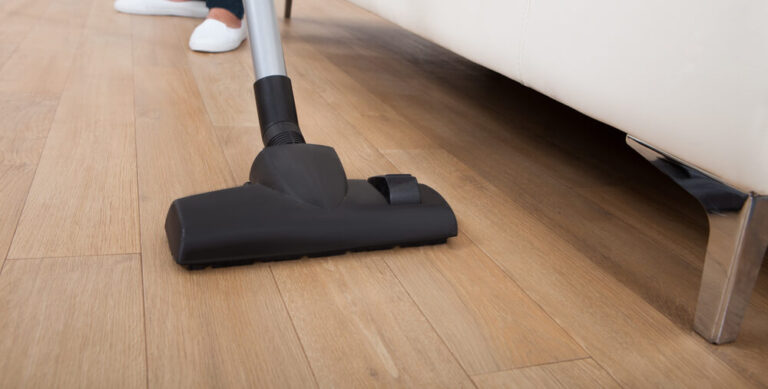

4 Comments